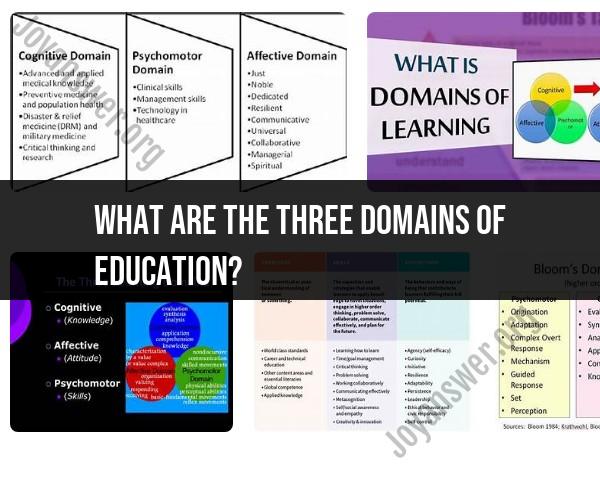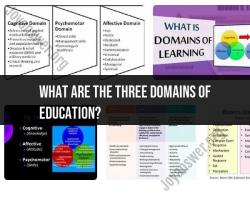What are the three domains of Education?
In education, there are three primary domains or categories that encompass different aspects of learning and development. These domains help educators and curriculum designers understand how students acquire knowledge and skills. The three domains of education are:
Cognitive Domain:
- The cognitive domain involves intellectual activities and the development of knowledge, thinking skills, and mental processes. It focuses on the acquisition of facts, concepts, problem-solving, and critical thinking. This domain is often associated with academic subjects and cognitive abilities. It is commonly categorized into different levels of cognitive skills, as outlined by Benjamin Bloom's Taxonomy of Educational Objectives, which includes six levels: Knowledge, Comprehension, Application, Analysis, Synthesis, and Evaluation.
Affective Domain:
- The affective domain deals with emotions, attitudes, values, and beliefs. It encompasses the development of students' feelings, interests, motivations, and interpersonal skills. This domain is concerned with the emotional and social aspects of learning, as well as ethical and moral development. It is often associated with character education, empathy, and the cultivation of positive attitudes and behaviors.
Psychomotor Domain:
- The psychomotor domain focuses on physical skills and the development of manual or physical abilities. It includes activities that require coordination, precision, and muscle memory. This domain is relevant to subjects like physical education, performing arts, and vocational or technical skills. Learning in the psychomotor domain involves practice, repetition, and physical mastery of skills.
These three domains collectively provide a comprehensive framework for understanding the various aspects of education and human development. Educators use these domains to design curricula, develop learning objectives, and assess student progress. Effective education often integrates elements from all three domains to promote well-rounded development and ensure that students not only gain knowledge but also develop emotional intelligence, social skills, and practical abilities.
What are the three domains of education and their significance in the learning process?
The three domains of education are:
- Cognitive domain: The cognitive domain refers to the intellectual skills and knowledge that students develop. This includes skills such as critical thinking, problem-solving, and decision-making.
- Affective domain: The affective domain refers to the emotional and social skills that students develop. This includes skills such as self-awareness, self-management, and relationship management.
- Psychomotor domain: The psychomotor domain refers to the physical skills that students develop. This includes skills such as fine motor skills, gross motor skills, and coordination.
All three domains are significant in the learning process. Students cannot learn effectively without developing skills in all three domains.
How do cognitive, affective, and psychomotor domains contribute to educational outcomes?
The cognitive domain contributes to educational outcomes by providing students with the knowledge and skills they need to succeed in school and in life. Students with strong cognitive skills are able to think critically, solve problems, and make informed decisions.
The affective domain contributes to educational outcomes by helping students develop the emotional and social skills they need to succeed in school and in life. Students with strong affective skills are able to manage their emotions, build relationships, and work effectively with others.
The psychomotor domain contributes to educational outcomes by helping students develop the physical skills they need to succeed in school and in life. Students with strong psychomotor skills are able to write, type, use tools, and participate in physical activities.
How to address and promote holistic development within these educational domains?
There are a number of things that educators and parents can do to address and promote holistic development within the three educational domains.
Cognitive development:
- Provide students with opportunities to develop critical thinking skills, such as comparing and contrasting information, evaluating evidence, and drawing conclusions.
- Teach students problem-solving strategies, such as identifying the problem, brainstorming solutions, and evaluating solutions.
- Help students to develop decision-making skills, such as gathering information, weighing pros and cons, and making a decision.
Affective development:
- Help students to develop self-awareness, such as identifying their strengths and weaknesses, understanding their emotions, and setting goals.
- Teach students self-management skills, such as managing their emotions, setting goals, and staying organized.
- Help students to develop relationship management skills, such as communicating effectively, resolving conflict, and working collaboratively.
Psychomotor development:
- Provide students with opportunities to develop fine motor skills, such as writing, drawing, and using tools.
- Teach students gross motor skills, such as running, jumping, and throwing.
- Help students to develop coordination skills, such as catching a ball or skipping rope.
By addressing and promoting holistic development within all three educational domains, educators and parents can help students to reach their full potential.
Here are some additional tips for promoting holistic development:
- Create a supportive and nurturing learning environment.
- Provide students with opportunities to learn in different ways.
- Encourage students to be curious and to ask questions.
- Help students to develop a sense of self-worth and confidence.*Celebrate students' successes.
By following these tips, educators and parents can help students to develop the skills and knowledge they need to succeed in school and in life.


